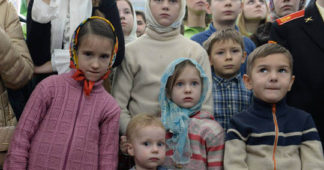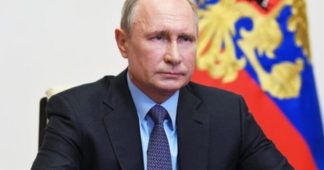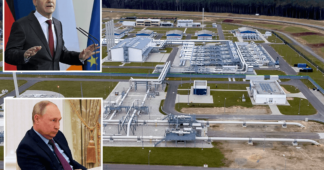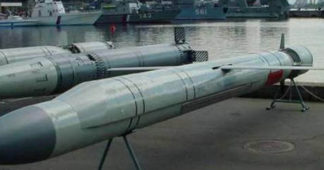By Christoph Vandreier
May 10, 2022
Seventy-seven years after the unconditional surrender of the Wehrmacht during World War II, German Chancellor Olaf Scholz (Social Democrats) used the anniversary to justify an unprecedented rearmament of the German army (Bundeswehr) and a massive expansion of the proxy war against Russia. To this end, he trivialized and relativized the crimes of the Nazi regime in an unspeakable manner and drew on the worst traditions of German great power politics.
German chancellors rarely address the population in a televised address on current issues. Merkel did so only once during her 16-year tenure, at the height of the coronavirus pandemic. Scholz now used this means on the day of the liberation from fascism to propagandise for an aggressive drive to war with Russia and announce further arms deliveries to Ukraine.
Scholz accused Russian President Vladimir Putin of wanting to “subjugate Ukraine to destroy its culture and identity” with his “barbaric attack.” In this way, according to Scholz, Putin brought “war, genocide and tyranny” back to Europe. “We defend law and freedom—alongside the attacked. We support Ukraine in the fight against the aggressor. Not doing so would mean surrendering to sheer violence—and encouraging the aggressor.”
Germany will therefore not accept “a Russian-dictated peace,” Scholz proclaimed, thereby indirectly admitting that he sees himself as a war party in the conflict. In keeping with this, he announced that he would supply Ukraine with further heavy weaponry to defeat Russia militarily.
The historic decision to let German tanks roll against Russia once again is not driven by “security and peace” and least of all the protection of the Ukrainian population. Instead, Germany and the other NATO powers have systematically provoked Russia’s reactionary invasion to allow them to wage a proxy war against Russia on the backs of the Ukrainian population.
As early as 2014, the German government supported the coup against Ukrainian President Viktor Yanukovych to bring the country into its own sphere of influence and against Russia. The coup was based on right-wing extremist paramilitaries, such as the Right Sector, which were to gain ever greater influence over politics in the following years.
In the months leading up to the Russian invasion, the Ukrainian government, with massive support from the US and Germany, has been preparing to bring the areas held by pro-Russian separatists in the east of the country under its military control. A war against Russia in Crimea was also planned.
The Putin regime reacted to this aggression with poisonous nationalism and its reactionary attack on Ukraine. This was seized upon by Germany as a pretext to implement the largest rearmament programme since the Second World War. All restrictions imposed on Germany after the world war are to be removed, and the Bundeswehr will be rebuilt into the largest European army.
When Scholz declares that Germany will not accept a “dictated peace” and is fighting for Russia’s military defeat, the logic is a direct confrontation with Russia, leading to a nuclear world war. He mentioned the concern about this danger only briefly before declaring in a dismissive manner, “Fear must not paralyze us.”
The German government has already delivered tanks from former East German stockpiles to Ukraine and announced further heavy arms deliveries. These include anti-aircraft tanks and self-propelled howitzers that are capable of enormous destruction. Germany and NATO are ready to lay waste to Ukraine in order to defeat Russia.
As before in the First and Second World Wars, this goes hand in hand with deafening war propaganda and with anti-Russian chauvinism and racism. “All Russians are our enemies now,” the Frankfurter Allgemeine Zeitung, for example, headlined an interview with Ukrainian Ambassador Andrij Melnyk, who is an avowed follower of the Nazi collaborator Stepan Bandera.
With its heavy weaponry, Germany is equipping the Azov Battalion and other neo-Nazi units. These groups are the political descendants of Bandera’s Organisation of Ukrainian Nationalists (OUN), which was responsible for the murder of thousands of Ukrainian Jews.
Scholz’s talk of “freedom and security in Europe” is just as credible as Hitler’s speech to the German people on June 22, 1941, the day of the German invasion of the Soviet Union. Hitler, too, based the justification for his war on attacks by the Soviet Union on Finland and Romania and declared: “But if the circumstances have forced me to remain silent again and again, the time has now come when continuing to stand by would not only be a sin of omission, but a crime against the German people, yes, against the whole of Europe.”
In Scholz’s official televised address on the day of unconditional surrender, the terms “Holocaust,” in which 6 million Jews were industrially exterminated, and “war of annihilation,” which was planned in detail by Nazi Germany, did not appear. At the beginning of his speech, he only mustered some general phrases about 60 million war victims and millions who were murdered on the front and in the concentration camps.
The rest of the speech was devoted to the Russian war against Ukraine. Only two days earlier, in a speech in Hamburg, Scholz used the terms “war of annihilation” and “break with civilization,” which were previously reserved for the description of the unprecedented crimes of the Wehrmacht. Scholz claimed that Russia was waging a “war of extermination” and was “breaking with civilization.”
This is an utter falsification of history that trivializes and relativizes the crimes of German imperialism. The Russian invasion of Ukraine is politically reactionary and appeals to Russian nationalism, but it cannot be compared to the Wehrmacht’s war of annihilation, let alone the Holocaust.
The forces deployed by the Putin regime against Ukraine are minuscule compared to the invasion force hurled by Hitler against Russia in 1941. Historian Stephen G. Fritz described the invasion as follows:
“Deploying over 3 million men, 3,600 tanks, 600,000 motorized vehicles (as well as 625,000 horses), 7,000 artillery pieces, and 2,500 aircraft (a number that was actually smaller than that employed during the invasion of France), the Germans had launched the largest military operation in history. [Ostkrieg: Hitler’s War of Extermination in the East]”
Germany’s “Operation Barbarossa,” Fritz continued: “was not only the most massive military campaign in history, but it also unleashed an unprecedented campaign of genocidal violence, of which the Holocaust remains the best-known example. This Judeocide, however, was not an isolated act of murder; rather, it formed part of a deliberate, comprehensive plan of exploitation, a utopian scheme of racial reorganization and demographic engineering of vast proportions.”
For a German chancellor, who is entirely familiar with this history, to compare the invasion of Ukraine to the Nazi war of extermination is politically obscene.
Moreover, the Russian campaign does not even come close to the brutality of the US-led and German-backed wars in Iraq, Afghanistan and Libya, where entire countries have been razed to the ground and millions of people killed. Even the New York Times had to admit this, quoting US officials in an article on May 3, that the Russian forces showed “remarkable restraint” in the war.
The German chancellor’s speech is part of a widespread falsification of history. The Social Democrat/Left Party/Green Senate government in the state of Berlin banned the display of Soviet flags at the memorial sites of the Red Army, while allowing the neo-Nazi group “The Third Way” to demonstrate at the Holocaust Memorial for Ukraine.
When the German government supported the coup of 2014 and proclaimed the “end of Germany’s military restraint,” this was accompanied by the trivialization of Nazi crimes. In February 2014 an article appeared in Der Spiegel, which quoted the now deceased Nazi apologist Ernst Nolte with the assertion “that the share the Poles and English had [in the outbreak of the Second World War] must be weighted more heavily than it usually is.”
In the same article, Jörg Baberowski, a professor at Humboldt University, declared: “Nolte was done an injustice. Historically speaking, he was right.” As a reason, he stated: “Hitler was not a psychopath, and he wasn’t vicious. He did not want to talk about the extermination of the Jews at his table.” In addition, he compared the Holocaust to shootings in the Russian civil war, commenting, “Essentially, it was the same thing: industrial killing.”
Baberowski was celebrated by representatives of all parties. Today, his revanchist positions are official government policy. Scholz’s attempt to use the slogan “Never again war!” to justify his war policy and falsification of history is particularly despicable. Contributing to “freedom and security” to the best of our ability, claimed Scholz, is the contemporary meaning of “Never again!”
The slogan “Never again!” already gained popularity after the First World War and was unforgettably portrayed by the communist artist Käthe Kollwitz. After the worst crimes in human history, which German imperialism unleashed in the Second World War, the sentence became deeply anchored in the consciousness of the masses in Germany and all over the world.
Scholz and the federal government will not erase this deep conviction with the hijacking of the slogan for their warmongering. On the contrary, the character of Germany’s war policy is becoming increasingly apparent. It encounters its main opposition in the working population.
It is now imperative to turn this opposition into conscious resistance and to arm it with an internationalist and socialist perspective. Only the active intervention of the Russian and Ukrainian workers together with the workers of all countries can stop the madness.
We remind our readers that publication of articles on our site does not mean that we agree with what is written. Our policy is to publish anything which we consider of interest, so as to assist our readers in forming their opinions. Sometimes we even publish articles with which we totally disagree, since we believe it is important for our readers to be informed on as wide a spectrum of views as possible.











